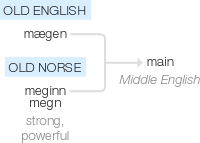Main
Middle English: from Old English mægen ‘physical force’, reinforced by Old Norse meginn, megn ‘strong, powerful’, both from a Germanic base meaning ‘have power’.
wiktionary
From Middle English mayn, main, maine, mæin, meyn, from main(noun) (see further at etymology 2); compare Old English mægen-(“strong, main, principal”)(used in combination) [1] and Old Norse megn, megenn(“strong, main”). The word is cognate with Old High German megīn(“strong, mighty”) (modern German Möge, Vermögen(“power, wealth”)), and also akin to Old English magan(“to be able to”). See also may.
From Middle English mayn, main, maine, mæine, mæȝen, from Old English mæġen(“strength”), [2] from Proto-Germanic *maginą(“strength, power, might”), *maginaz(“strong”), from Proto-Indo-European *megʰ-(“be able”). The word is cognate with Old High German magen, megin, Old Norse magn, megn, megin, Old Saxon megin. [3] More recent senses are derived from the adjective.
Origin uncertain; probably from the adjective main. Evidence is lacking for a derivation from French main(“hand”). [4]
Origin uncertain, possibly from French main(“hand”).
etymonline
main (n.)
Old English mægen (Mercian megen) "power, bodily strength; force, violent effort; strength of mind or will; efficacy; supernatural power," from Proto-Germanic *maginam "power" (source also of Old High German megin "strength, power, ability"), suffixed form of PIE root *magh- "to be able, have power."
Original sense of "power" is preserved in phrase might and main. Also used in Middle English for "royal power or authority" (c. 1400), "military strength" (c. 1300), "application of force" (c. 1300). Meaning "chief or main part" (c. 1600) now is archaic or obsolete. Meaning "principal duct, pipe, or channel in a utility system" is first recorded 1727 in main drain.
Used since 1540s for "continuous stretch of land or water;" in nautical jargon used loosely for "the ocean," but in Spanish Main the word is short for mainland and refers to the coast between Panama and Orinoco (as contrasted to the islands of the West Indies).
main (adj.)
early 13c., "notably large, bulky, or strong" (a sense now obsolete), from Old English mægen- "power, strength, force," used in compounds (such as mægensibb "great love," mægenbyrðen "heavy burden;" see main (n.)), probably also in part from or influenced by cognate Old Norse megenn (adj.) "strong, powerful, mighty."
Sense of "chief, principal, prime" is from c. 1400. That of "principal or chief in size or extent" is from 1590s. Main chance "opportunity of enriching oneself" is by 1570s, from the game of hazard. Main course in the meal sense attested from 1829. Main man "favorite male friend; hero" is by 1967, African-American vernacular.
